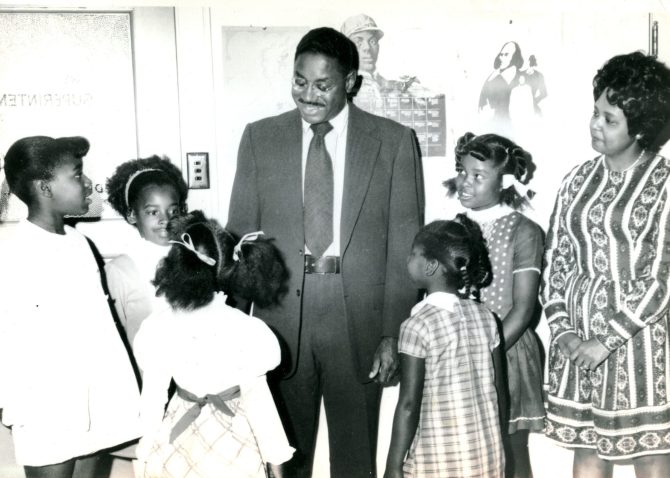November 6, 2023 marks the 50th anniversary of the assassination of Dr. Marcus Foster, who was serving as Superintendent of Oakland Schools at the time of his death. Today Dr. Foster may be mostly remembered for two basic facts: 1. he was the first Black Superintendent of Oakland schools, and one of the first Black Superintendents of a large urban school system in the country, and 2. he was assassinated by the SLA.
In our current exhibit, Dr. Marcus Foster: Making Oakland Schools Work, I wanted to go beyond those basics to provide a fuller picture of Dr. Foster's life, his work, and his lasting legacy in Oakland's schools.
Stories about Dr. Foster often read like he was a magician or a mythical figure of some sort, because he was able to find solutions to problems that were seen as insurmountable to past administrators. Some of the programs he worked on were also so ahead of their time that we're still working on re-introducing them in our schools today. We don't have space to put everything into the exhibit, but I hope it will inspire people to dig deeper and learn more about this remarkable man.
One surprisingly interesting part of the exhibit for me was the story behind how Dr. Foster came to Oakland. He was hired at the end of a decade of community protests of the school board and the schools. Community members, especially Black community members, felt that they weren't being given a role in decisions about the schools that impacted their children in enormous ways. Foster was excited to come to Oakland, where the community was painted as "militant" or oppositional, because he knew he could harness that energy and use it to make the schools better for everyone. He transformed the community's relationship with the school board by giving people real and meaningful ways to participate and make their voices heard.
The most heart-wrenching item on display in our exhibit is probably Dr. Foster's appointment book. Foster worked non-stop in his commitment to improving Oakland's schools, and his appointment book shows a packed schedule, with all the appointments after November 6 meticulously crossed out in red pencil. We have the pages from the week of his death on display, but the schedule was actually packed with appointments and other obligations through the end of the year. Seeing this makes his death seem more tangible and at least for me it makes me think about what could have been if he had been there for all of those appointments and for the years after 1973. Although he had a huge impact in a short time, it's hard not to wonder what he could have done with a few more years.
I won't go into detail about his story here, because you can find that in the exhibit. Instead I will leave you with this list of links to some of the books and online resources that are featured in the exhibit.
I hope you'll have time to come and see the full exhibit before the end of the year. You can also see a related but totally different exhibit about Marcus Foster at AAMLO through the end of November.




Add a comment to: Dr. Marcus Foster: Making Oakland Schools Work